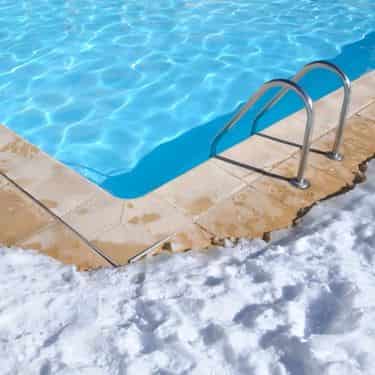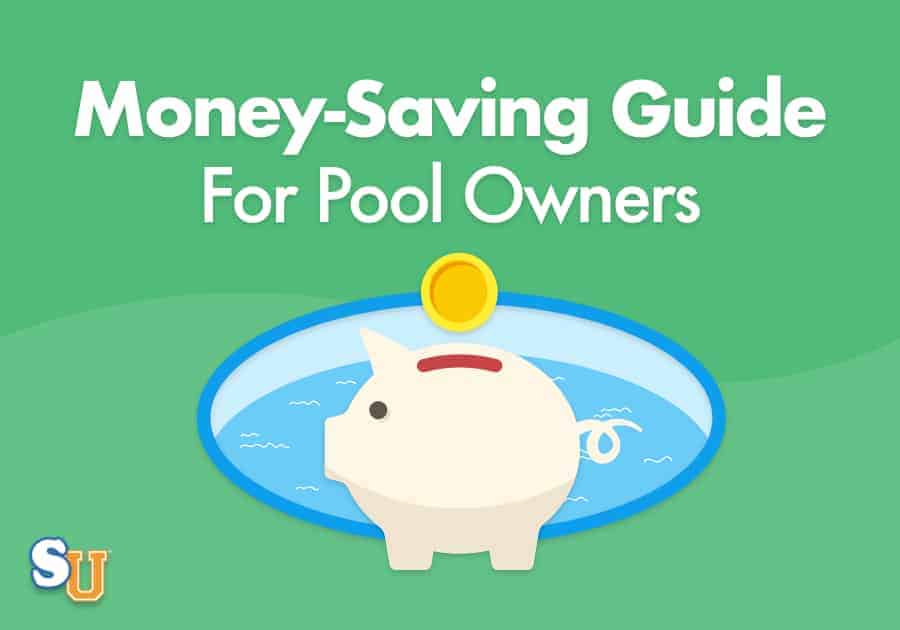Winter can mark the end of the swimming season for many swimmers. However, with heated outdoor pools, we can still enjoy an outdoor swim with reduced risk of cold exposure.
Many open water swimmers, like those who swim in the sea, lakes and rivers in the summer months, will transition to an outdoor heated pool for the winter in order to maintain their routine.
On average, outdoor pool temperature ranges from 26°C to 28°C for public heated pools; however, this will vary between pools. In the winter, some heated outdoor pool temperatures can fall between 20°C to 24°C, but again, this depends on the pool.
There is no standard temperature for an outdoor pool, be it public or private. However, we consider a temperature between 26°C to 28°C a good range for comfort.
As a reference, most competitive and fitness pools in the UK are around 28°C, with recreational public pools heated to around 29°C.
Not all public outdoor pools are heated, so if you visit an outdoor pool in the winter, ensure you check if the water will be heated or cold before you travel. Cold water can be dangerous and feel painful for those who are not acclimatised.
In this article I will cover outdoor pool temperatures, what to expect and what it feels like, covering:
- What temperature are outdoor pools heated to?
- Can I swim in an outdoor pool in winter?
- Are heated outdoor pools colder in the winter?
- What is a cold pool temperature?

What Temperature Are Outdoor Pools Heated To?
As the human body has such a wide tolerance to cold, and we all have different cold sensitivity levels, pool temperatures are a debated topic amongst swimmers. What is too cold for me, could be too hot for you.
Public pool managers tend to turn the heat up for public pools, as warmer pools usually attract more users. But with the recent surge in energy prices, I have noticed that my local pool has dropped a few degrees in temperature as pool managers try to save on the heating bill.
They usually heat public outdoor pools to the same recommendations as indoor public pools, which is in the 26°C-29°C, with competition pools heated to 28°C.
If you are a private pool owner, it may tempt you to turn the heating even higher, to 29°C – 32°C. But such high temperatures are not good for fitness training, as you will overheat while you work out.
For those with arthritis or seniors with sore joints, then this warmer water can feel good. If you are eager for such warmer temperatures, it may be easier and more cost-effective to get a hot tub instead.
On the downside, the more you turn up the heating on your pool, the more expensive it will be to heat. According to the Swimming Pool Allied Trade Association, turning up your temperature by just 2.8°C [5°F] will double your heating costs.
In addition, warmer water is a breeding ground for algae and bacteria. Once your pool temperature hits the 29°C and higher temperature range, algae and bacteria will multiply exponentially, so it is important to keep your pool chemistry in balance if you decide to go for higher temperatures.
In the winter, heated outdoor pools will battle colder air temperatures, which cause the water to cool and evaporate at a faster rate. In the UK, some outdoor public swimming pools (lidos) are heated to between 20°C-24°C.
There is no set value for this, so it is worth checking the temperature of the outdoor pool you are planning to visit before you travel.
As a swimmer in the winter, when you exit a heated pool, the water on your skin will evaporate quicker, which will make you feel cold very quickly.
If you swim for fitness, I find this temperature exhilarating as you do not overheat. Personally, the cooler water feels refreshing on my joints.
Can I Swim In An Outdoor Pool In Winter?
Swimming in a heated outdoor pool is an exhilarating experience, especially in the winter. Heated pools are lovely in the winter as you get the contrast between cold air and warm water.
Unheated pools can be dangerous in the winter as water temperatures drop below 18°C. For those who are not accustomed to swimming in water that is less than 20°C, it can feel exceptionally cold.
To learn more about cold water and what to expect as a beginner, I have covered this in greater detail in this article, Swimming In Cold Water (What to expect as a beginner)
Can I Swim In The Rain?
Most outdoor pools will remain open in the rain, as it is OK to swim in the rain as long as it is mild weather.
It is not safe to swim in a thunderstorm outdoors as a risk of a lightning strike is high.
In the UK, outdoor public pools (lidos) will usually remain open in the rain but will close if there is a thunderstorm or risk of lightning within a 5-mile radius.
Are Heated Outdoor Pools Colder In The Winter?
In the winter, the air temperature drops, which will affect the temperature of the water.
Many outdoor heated pools will still maintain a warm temperature of between 26°C to 28°C, despite cold air temperatures of less than 15°C.
The temperature of the pool water depends on the pool heating system and how hard they run the heater in the winter. Obviously, because of the extra heating demand required by pools in the winter, they can be more expensive to run in the winter.
There are many heating options available to pool owners, and if you plan to run your outdoor heated pool in the winter, ensure you get a heating system that is cost-effective to use during the winter months.
I recommend Swim University as a great source of information for those who want information on how to heat their outdoor pools in the winter.
What Is A Cold Pool Temperature?
The National Centre For Cold Water Safety recommends that we treat any body of water that is colder than 21°C with caution. [source]
Below 25°C our breathing can be affected, and for swimmers who are not acclimatised to the colder water, maximum cold water shock intensity can take place between 10°C – 15°C (50°F – 60°F).
I compiled this data from the National Centre For Cold Water Safety and what they consider cold water to be. For more information, I highly recommend their website.
| Cold Water Temperature | Water Conditions |
|---|---|
| 30°C – 40°C [86°F – 104°F] | The water will feel sensuous and warm. |
| 25°C – 30°C [77°F – 86°F] | The water feels cool, but lovely to swim in. Good for recreational and fitness swimming. |
| 20°C – 25°C [68°F – 77°F] | In this region, the water temperature is classified as cold. Because of this, our breathing can be affected. |
| 15°C – 20°C [59°F – 68°F] | 21°C (70°F) should be treated with caution. We’re now in the danger zone of severe cold. |
| 10°C – 15°C [50°F – 59°F] | It is very dangerously cold in this water temperature zone. This area might be painful for many people. In this region, you will experience the maximum intensity of cold water shock. |
| Below 10°C [50°F] | Below this region is exceptionally dangerous and painful. Only for the very experienced. |
To learn more about cold water and when to get out, I have covered this in much greater detail in this article, How Long Should You Stay In Cold Water? (When to get out)
Final Thoughts
Although the temperature of outdoor pools in winter will vary depending on several factors, most heated outdoor pools will maintain a warm water temperature between 26°C and 28°C.
There is no standard temperature for outdoor public pools. Therefore, temperatures can fall to as low as 28°C.
If you plan to visit an outdoor public pool in the winter, I recommend you check if the pool is heated first, to ensure they do not leave you swimming in cold water that you are unprepared for. If you’re not accustomed to swimming in cold water, it can feel very cold below 21°C.
Swimming in an outdoor pool is a wonderful thing, especially in the winter. It is also a fantastic option for any outdoor swimmer who wants to remain outdoors for the winter but would like to avoid cold lakes and the sea.
Happy swimming!

